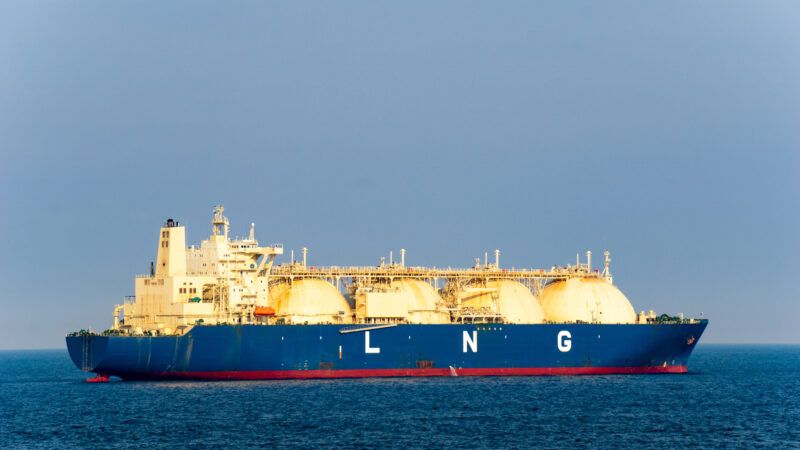Puerto Rico Pays More For American Energy Than Its Neighbor
Because of the century-old Jones Act, U.S. citizens in Puerto Rico must use overpriced, outdated ships to import American LNG—while the Dominican Republic enjoys cheaper energy from the same source.

Crowley Maritime, an American shipping company, recently announced that it raised the U.S. flag on a 31-year-old French-built LNG carrier to comply with the Jones Act—a 100-year-old law—finally allowing for U.S. LNG to be shipped from the U.S. mainland to Puerto Rico through a loophole in the protectionist law.
A Major Problem With Minor Relief
Over 100 years ago, Congress passed the Merchant Marine Act of 1920, better known as the Jones Act, requiring all goods transported between U.S. ports to be carried on ships that are built in the United States, owned by U.S. citizens, crewed by Americans, and flagged under the United States. While support for the Jones Act was built on maintaining a strong U.S. maritime industry and protecting national security, it has failed to live up to these promises.
Due to absurdly strict requirements, the Jones Act increases the cost of shipping and ship manufacturing by limiting competition in domestic markets and even inspiring collusion. These inflated costs have historically made it impossible for Puerto Rico to import LNG from the United States. Unlike the mainland, Puerto Rico can't import LNG via trucking or rail and must instead import LNG using Jones Act carriers (which, until recently, didn't exist).
There is, however, a minor workaround. The U.S. Coast Guard Authorization Act of 1996 grants coastwise authorization (which is required for transportation of U.S. LNG to Puerto Rico) to foreign ships built before October 19, 1996, so long as they meet the remaining Jones Act requirements. This technical exception allowed Crowley Maritime's recently purchased American Energy, an LNG carrier built in France in 1994, to finally start supplying LNG to Puerto Rico.
This technicality offers a raindrop of relief to Puerto Rico, but it does little to address the financial costs of the Jones Act.
Shipping to Foreigners is Still Cheaper
While Puerto Rico's economy is strangled by inflated costs because of the Jones Act, the Dominican Republic is free from its restrictions, and it imports U.S. LNG at a fraction of the cost. Global markets are much more competitive and have access to modern, efficient LNG carriers. As a result, shipping prices are dramatically cheaper.
In the most recent Maritime Administration operating cost report, it was revealed that "U.S.-flag crewing costs were roughly 5.3 times higher than foreign-flag vessels in 2010" and a recent post on X by Sen. Mark Kelly (D–Ariz.) shows that the cost of operating a U.S. flagged vessel is 4.3 times higher than foreign ships—$8.5 million more.
The Dominican Republic is able to use more efficient and cheaper foreign LNG carriers that have had transportation prices as low as $3,500 per day in 2025. Even their most recent estimated operating costs of $15,000 per day pale in comparison to the estimated $64,500 per day in operating costs alone for the U.S.-flagged LNG carrier.
Puerto Rico is also forced to pay more for the product itself as a result of the Jones Act. A 2020 contract between the Puerto Rico Electric Power Authority (PREPA) and Naturgy (a major energy company in Puerto Rico) includes a provision that states, "If the Jones Act is repealed, or amended such that it does not apply to shipping LNG from the US mainland to Puerto Rico, or a waiver of the Jones Act is granted that permits shipping from the US mainland to Puerto Rico without complying with the Jones Act," would result in an 8 percent unit price reduction.
"American Energy" Isn't the Answer
Crowley's new ship is not a long-term solution. The vessel is old, has a smaller than average shipping capacity, and is only Jones Act-approved because of a loophole. This is not innovation; it's desperation and it shows to what extent Puerto Rico has to go to receive relatively cheap American energy.
Rather than modernizing our maritime fleet to be competitive on a global scale, we're instead buying unwanted vessels from other countries and celebrating them as innovative solutions. In truth, American Energy is a reminder that the United States citizens in Puerto Rico are being exploited because of a century-old law that has done nothing good for us.
The problem is the Jones Act, and the answer is repealing it.
It's time to stop patching holes in a sinking ship. The Jones Act is a policy failure that has harmed the people of Puerto Rico for over a century. The truth is that Puerto Rico should not have to rely on legal loopholes to access American goods. Foreign nations should not have cheaper access to American products just because they aren't bound by U.S. laws. Repealing the Jones Act isn't radical—it's necessary, and it provides immediate benefit to the Americans in Puerto Rico.
